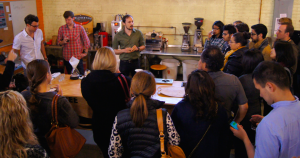

During Cannes Lions 2015, health advocate Jamie Oliver was asked by moderator Richard Edelman for his advice to brands.
The chef didn’t mince words.
“Be clear and be honest,” Oliver told the packed crowd of attendees. “It’s OK to sell chocolate. Just be honest and clear. Beware very carefully of how you market to kids. Because we’ll get you. We’ll single you out, and we’ll batter you.”
For years, Oliver has been crusading against obesity among children in the U.S. and U.K., and his message – and threat – primarily was aimed at food marketers, but the advice applies to brands of any ilk.
At AE Marketing Group, we strongly believe,
That’s why we’ve worked with our customer Network Health to launch the “End the Jargon” initiative, which makes sense of confusing health insurance language through easy-to-understand language and content. And it’s why we push other brands to be equally transparent, truthful and authentic.
For some, authenticity can be a fuzzy concept. The Journal of Business Research has found that consumers see three dimensions to brand authenticity:
And in a recent article, the New York Times used Patagonia an an example of a brand leveraging such authenticity well. Seven years ago, that outdoor apparel chain launched the Footprint Chronicles on its company website, documenting its supply chain with videos, articles and an interactive map showing the farms, factories and textile mills it works with.
Jill Dumain, Patagonia’s director of environmental strategy, says that the company’s transparency has led to some criticisms — that it should be using more recycled polyester, for example — but that it has strengthened brand loyalty among customers as well.
When Patagonia launched the Chronicles, she said, “The reaction I feel like I heard the most was,
The clear and uncluttered information has empowered people to be better informed about their purchases with Dumain adding,
And that means a deeper brand connection. Soraya Darabi, a co-founder of the online retailer Zady, which sells clothing, household items, jewelry and office supplies from companies that the founders have researched for ethical practices and whose stories they share on the site says, “We’re at a precipice in what people are about to begin questioning, and our brand is there to give them some answers.”
To strengthen authenticity, today’s brands should always leverage their knowledge and expertise to offer consumers answers. In fact, Mark Roberge, chief revenue officer of HubSpot, recently suggested that “Always be closing” – the iconic battle cry for salesmen from the film “Glengarry Glenn Ross – should be updated for brands today to, “Always be helping.”
We agree.
To learn more about the AE Brand Lab Series and what it can do for your company, simply click here.